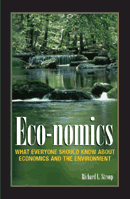Eco-nomics [comments below, and picture above from Cato Institute website.]
It’s one thing to be passionate about protecting the environment. It’s another to be successful at it. Many laws have been enacted to clean up pollution or preserve natural beauty, but many of them don’t work and others have unintended consequences. In this book, Stroup explains why many of our environmental laws have failed us and how we might go about doing a better job of protecting nature.
Richard L. Stroup is an adjunct scholar at the Cato Institute and a senior associate at the Property and Environment Research Center (PERC) in Bozeman, Montana. He is also the co-author of What Everyone Should Know About Economics and Prosperity.
“…less than 100 pages long but contains powerful lessons for sensible approaches to the world’s environmental issues.”
–Walter Williams
“…a useful read for all sides of the debate.”
–National Journal.com
“Rick Stroup has done it again. In plain English, he’s applied commonsense economics to challenging environmental problems. This short primer is one that should be read, enjoyed, and saved for future reference.”
–Bruce Yandle, Professor of Economics Emeritus, Clemson University
“Rick Stroup’s volume is thin but weighty. He packages essential insights in readable buy concise prose. Whether or not they end up accepting Stroup’s prescriptions, environmental advocates of all stripes ought to consider consider them carefully. Far too much effort has been wasted on ineffective and inefficient approaches to environmental improvement. Environmentalists and public decisionmakers ought to at least wrestle with the same questions Stroup does before deciding on a course of action. He has given them an enlightening and provocative template for doing so.”
–David Simpson, Senior Fellow, Resources for the Future
Introduction and Chapter One available online here: http://www.catostore.org/index.asp?fa=ProductDetails&pid=1441094&method=search&t=eco%2Dnomics&a=&k=&aeid=&adv=&pg=


Hello IES-Europe Students…
For those who accepted copy of Eco-nomics at the seminar in Varna, please post you comments on the book here. I hope you find another student interested in reading the book and posting their comments too.
–Greg Rehmke
„Eco-nomics” is, just as its name states, a book that uses basic economic principles to try to answer the environmental problems of the world. Though written in a simple manner, it poses important questions and finds simple, understandable answers, mostly market-based. Stroup emphasises on the importance of the relations that appear in a market system, meant to preserve assets in order to produce future wealth. These relations can be extensively used to protect the environment, by transfering some of the government property to the private one. For example, different interests in using a stream (fishing, camping, irrigation) can lead to an exchange of money over rights, creating an incentive for the owner to preserve it for more future exchange.
The market, through its mechanisms, reveals the public need for a certain type of recreation in the wild, thus creating the incentive for its preservation. In today’s polluted, iron-concrete-glass world, a piece of greenland is becoming more and more valuable, turning in a genuine asset that can produce wealth. But not only revenue-seekers can and should become owners of environment. Organizations for environmental protection, as well as private environmentalists, participate in trades in order to obtain and protect areas of fauna and flora.
Stroup does recognize the role of the government institutions in the market environmentalism, by regulation and control over how well preserved the latter is. This is because the owners of some pieces of land, forest, streams or lakes might abuse their property rights and the intended environment protection might turn into the opposite.
Problems appear when the government uses coercion upon landowners, in order to preserve wilderness, but interferes with their property rights. That is why it is preferable to replace government coercion with market cooperation and come up with benefits for both landowners and the environment. Also, different government institutions have a tendency towards tunnel vision, which is pursuing a goal beyond the borders of economic and ecological efficiency and without any regard to other purposes. Instead of competing in their actions, these organizations should cooperate and come up with better results.
An important matter that Stroup brings up is state funding for different programs, organizations and national parks. Without any incentive for efficiency, these funds are often dissipated for the sake of spending. Practice has shown that, when incentives such as self-sustaining through entry fees in national parks appear, better services and better fund management are encouraged.
Richard Stroup finds some solutions to protecting the environment and also states the prerequisities for them, but I would argue that his point of view is only sustainable in certain countries that can offer the proper infrastructure, legislation and economic culture among its citizens. For instance, privatizing a part of a forest might end in ground-cutting the trees by the owner, if he was looking for immediate profit and can’t see the future benefits of an asset.
Overall, „Eco-nomics” is an interesting book that brings new perspectives to both the market system and the environmental problems, a must read for any eco-nomist.